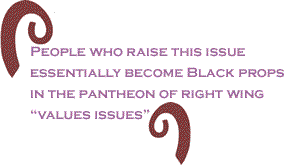
|
||||||||||||||||||||||
 |
||||||||||||||||||||||
 |
||||||||||||||||||||||
 |
||||||||||||||||||||||
 |
||||||||||||||||||||||
 |
||||||||||||||||||||||
 |
| The current issue is always free to everyone |
|
|
 |
| I want to address an issue which has been on my mind for decades - the portrayal of a false dichotomy between the movements for social, political and economic justice for Black Americans and the importance of personal responsibility, integrity and accountability in one’s personal life. Since the 1980's I have watched as several Black American intellectuals have come forward with a strong voice focused on the fundamental importance of personal decisions and integrity in building a prosperous life and taking advantage of the opportunities in this country. I think of Shelby Steele and his book The Content of Our Character: A New Vision of Race In America. And now Bill Cosby, with his personal campaign and speaking tour.
It is false and misleading to say or imply that the message of personal integrity and responsibility is not central to the moral and political thrust of the Civil Rights movement. Many of us have benefited from the increased opportunities brought about by this social movement in which we and/or our parents and families probably participated. Does that mean that we do not value personal integrity and responsibility??? There has been a historical divergence between two perspectives articulated in the very public debate between WEB DuBois and Booker T Washington. At that time, in the shadow of slavery, the issues and the facts were more stark. “Separate but equal” was the law of the land. Only the “separate” part was enforced and encoded in the Jim Crow laws. Black Americans were legally barred from social, economic and political opportunities. Although individual circumstance may have allowed a Black person to advance as was the case with both Booker T. Washington and WEB DuBois, the legal and political structures were designed to prevent Black American advancement. Those who like to point to the “failures of the civil rights movement” as a critique of social action, themselves fail to recognize the transformative effect that the Civil Rights and Black Power movements had on this country and on our individual lives. It is important to look at the unintended outcomes of the Civil Rights and Black Power movements from the perspective of history. All actions have unintended outcomes. Growth and leadership comes through engaging and analyzing these outcomes to inform your future decisions and actions. The division of these two imperatives, as if they represent opposite ends of the political spectrum now, does not serve the best interests of the Black community in this country at this time, or of any community in this country for that matter. In fact, both personal accountability and social justice are necessary for the full potential contribution of our young men and women to be realized. In the late 1970’s and early 1980’s I was director of a program that was to provide an opportunity for economically disadvantaged minorities and white students from the United Negro College Fund (UNCF), state, and community college schools, who had a record of performing well in premedical courses, to come and take courses and learn more about the medical profession and the application and admission process sponsored by a prestigious private university. The applicant pool was nation-wide and there were established relationships with premedical advisors at many UNCF schools, state schools, and community colleges. Among the Black students, the female applicant pool average grade was B+. Among the males, there were a few standouts, but the average was about a C. In order to strengthen the male applicant pool I initiated recruitment activities focused on Black male students. The numbers and grades increased, but many of them were either immigrants or first generation children from the West Indies. From my own study of African American history, I knew that, particularly in New York, there has been a history of tension between the West Indian immigrant community and the Black American community.
I was recently introduced to this wording of
the concept in the book Post
Traumatic Slave Syndrome: America's Legacy of Enduring Injury
and Healing I remember speaking with a college classmate during the Reagan years about some of the social issues affecting the Black community (homelessness, drug addiction, poverty). His response was “Who is looking out for me - I am working hard and paying my taxes. Who is trying to help me get ahead?” He said it with annoyance as if he was tired of hearing about the downtrodden who weren't doing anything for themselves. My thought was that he is looking out for himself, because he is in a position to do so. He and I and others in our circumstances can look out for each other. We are linked to our communities and their situation in this country whether we like it or not. I work in a very white suburban community hospital. I was in pantry area of the physicians’ lounge one day during the last election and a group of doctors in the sitting area behind a wall were talking politics. I heard a voice say in response to a question, “Well, black people don't count because they don’t vote.” And the white folks in the pantry section all looked at me. I do vote, and I understand that many Black people believe that their individual vote does not count. With the history in the 2000 and 2004 national elections of “caging” as a means of voter suppression, there is a real basis for that belief. It does not change the importance of each Black person casting their ballot at every opportunity.
I understand why Bill Cosby is beating the drum for personal responsibility, and he is taking his message directly to inner city communities. I have listened to Michael Eric Dyson and read some of his work and I do agree with his analysis - there are powerful economic, social and political forces that are vested in keeping the Black community in its current state of economic subjugation and political impotence. When the movement for social justice for Black Americans is presented as the opposite of individual responsibility, that is a divisive political strategy which undermines our strength and coherence as a community. The message of personal accountability and integrity, should be a progressive one because it is a message our community needs to embrace and embody to move forward. It should be placed in the context of the economic, political, and social forces that affect our community. It should be an inspirational message of possibility and hope. To paraphrase a friend of mine “Individual responsibility is important, social responsibility is essential”. BlackCommentator.com Guest Commentator, David Memnon, is a Black American professional from the Civil Rights/Baby Boom generation. Click here to contact Mr. Memnon. |
Your comments are always welcome. e-Mail
re-print notice
If you send us an e-Mail message we may publish all or part of it, unless you tell us it is not for publication. You may also request that we withhold your name. Thank you very much for your readership. |
|
| May
1, 2008 Issue 275 |
|
| Executive Editor: Bill Fletcher, Jr. |
| Publisher: Peter Gamble |
| Est. April 5, 2002 |
| Printer Friendly Version in resizeable plain text format format |
 |
 |
 |
| |
| |






















 I
have watched as people who raise this issue are isolated and
marginalized in press and by critics in the Black community.
Relative to the numerous issues facing the Black community,
poverty and unemployment, lack of quality educational opportunity,
lack of job training, inadequate affordable housing, inadequate
health care facilities and access, drug addiction, gangs and
gun violence, inadequate infrastructure and maintenance in
the Black community, the role of the individual can seem inconsequential.
People who raise this issue essentially become Black props
in the pantheon of right wing “values issues”. I have often
wondered, do they become right wing spokesmen by choice, or
do they seek refuge there? (I do not know the answer, I am
certain it varies based on the individual.)
I
have watched as people who raise this issue are isolated and
marginalized in press and by critics in the Black community.
Relative to the numerous issues facing the Black community,
poverty and unemployment, lack of quality educational opportunity,
lack of job training, inadequate affordable housing, inadequate
health care facilities and access, drug addiction, gangs and
gun violence, inadequate infrastructure and maintenance in
the Black community, the role of the individual can seem inconsequential.
People who raise this issue essentially become Black props
in the pantheon of right wing “values issues”. I have often
wondered, do they become right wing spokesmen by choice, or
do they seek refuge there? (I do not know the answer, I am
certain it varies based on the individual.)
 West
Indians (particularly Jamaicans) would come to the United
States and have much greater success than Black Americans
who had lived here for generations. My own conclusion and
belief is that immigrants from the West Indies grow up in
countries which may be poor or lacking in opportunities, but
the social, political and economic structure is dominated
by black people! There is no actual or psychological limit
on how high a person can rise in that society based on skin
color. They have no internalized limitation on what they feel
they can have access to, or how many chances they will pursue
to succeed, or how many opportunities they are entitled to.
When they come to this country, they may experience racism
and discrimination, but their own personal self-esteem and
aspirations are not limited by a personal history of “racial
socialization”.
West
Indians (particularly Jamaicans) would come to the United
States and have much greater success than Black Americans
who had lived here for generations. My own conclusion and
belief is that immigrants from the West Indies grow up in
countries which may be poor or lacking in opportunities, but
the social, political and economic structure is dominated
by black people! There is no actual or psychological limit
on how high a person can rise in that society based on skin
color. They have no internalized limitation on what they feel
they can have access to, or how many chances they will pursue
to succeed, or how many opportunities they are entitled to.
When they come to this country, they may experience racism
and discrimination, but their own personal self-esteem and
aspirations are not limited by a personal history of “racial
socialization”.







